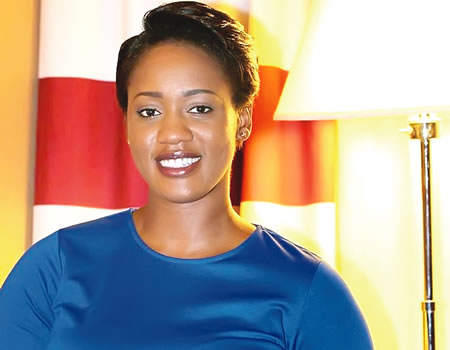ALSO READ: LAUTECH protests new tuition increase
What informed your choice of career?
I have never known anything other than the healthcare industry. I have been in the sector for over 14 years. I believe my name had a lot to do with my choice to follow a career in health. My first name means “Good Mother” and I have always associated it with helping, healing and serving. When I discovered health as a career it exemplified everything that I wanted to be and associated with. There is a satisfaction that comes with being health personnel, because it is selfless, and I have always wanted to be in a position where I can help others that are in need and see their progress towards healing. I consider myself a social entrepreneur with a passion to leverage innovation and user experience to drive healthcare delivery, increase accessibility, improve quality and positive outcomes. I am the founder of efferentCARES Initiative, which is a social impact organisation dedicated to providing inclusive health technology to deserving health practitioners, health organisations, citizens and communities to enable access to quality healthcare
What price did you pay to get to where you are today?
The decision to uproot my life and career in the US to relocate to Nigeria at the beginning of a recession and set up a technology-focused initiative was a major sacrifice because I left my family, friends and a way of life/comforts that I have known for over 27 years. It was quite an adjustment because relocation and going through that change is never easy and no one can ever fully be prepared for it, but I was driven by my passion and my belief that I could do something impactful. I am thankful that that passion has led me to gain a wonderful experience and to learn about who I am as a person and also save lives through the efferentCARES Initiative – Screen HER Programme.
What is the most defining moment of your career so far?
The incidence of Ebola virus in 2014 was by far the most defining moment in my career because had it not happened, I will probably not be in out Nigeria today. When the news first broke and was reported and verified, I couldn’t believe that in this day and age Africa was still facing such epidemics. Watching the reports of how the disease was spreading and the lack of preparedness of many health agencies to contain the problem and the massive funding and resources provided by the international agencies, I felt uneasy standing on the side lines watching as the epidemic unfolded. I knew that if the proper technology had been in place, there would have been greater visibility and monitoring of the virus and its spread. I knew then that I couldn’t just sit back and watch and that I needed to do something. That moment has led me to where I am now and that is to be a true part of the solution to our healthcare gaps.
When and how did efferentCARES Initiative start?
When I moved to Nigeria and was studying the health sector and how technology was being used. I was researching various prevalence of non-communicable diseases and I came across a statement by Dr. Ngozi Okonjo-Iweala that said, “Africa is in danger of sleepwalking into a cancer crisis” and that struck me and made me to research into cancer prevalence in Nigeria and Africa. During my research, I learned about the prevalence of cervical cancer and I was shocked about how majority of awareness initiatives were focused on breast cancer and prostate cancer while, cervical cancer is the only preventable with vaccination, most treatable when diagnosed early but I didn’t find many comprehensive cervical cancer programme and more shocking was that many women were not aware of what cervical cancer was or how it can affect them. Once I realised this, I knew I had found my focus and efferentCARES Initiative was founded as a social impact non-governmental organisation dedicated to improving health delivery and access through innovative solutions across Africa. In the quest for a solution to the cervical cancer prevalence, the Screen HER programme was created which aims to provide access to cervical cancer screening and treatment to women across all levels of care regardless of socioeconomic status. With the Screen HER programme our belief is that in order to save women’s lives and increase the awareness of cervical cancer, there has to be continuous access to screening and treatment options within their communities.
Let’s talk about cervical cancer. Why is the awareness for it low in Nigeria compared with that of breast cancer? What are its causes and symptoms?
Before we talk about why awareness is so low we first need to understand the prevalence of cervical cancer and why it has become critical to address in Nigeria. Cervical cancer is the second most common cancer among women between the ages of 15yrs and 49yrs. seven million women with advanced stages of cervical cancer are unaware. 85% of cervical cancer cases occur in developing countries. Cases of cancer in developing regions are set to double by year 2025. In Nigeria alone the most relevant data shows us that, Nigeria accounts for 17% of all cervical cancer deaths in Africa. Over 14,000 cases are clinically diagnosed every year while 64% of those diagnosed die due to late detection of the disease. It is estimated that everyday 26+ women die as a result of cervical cancer leaving 47 million women at risk.
In Nigeria, there is no nationally adopted cervical screening programme which hampers on the health-seeking behaviour of women in the region. Generally, awareness levels are low due to cultural barriers, limited family support and community participation and the health system is dense with rural areas being underserved compared to their urban counterparts.
Cervical cancer is caused largely by the human papillomavirus (HPV) which is a sexually transmitted infection. The HPV types 16 and 18 have been found to be responsible for most cervical cancer cases. At its early stage, cervical cancer gives no signs/symptoms hence why it’s called a “silent killer disease,” it takes years to develop. However, as the disease progresses, the woman begins to notice symptoms such as foul-smelling vaginal discharge, persistent pelvic pain, bleeding in between periods, and pain after sexual intercourse. Once these symptoms start to develop, it is advised that the woman seeks the help of medical personnel (doctor/nurse).
Is there a cure for it and how affordable is it?
Currently, there are different treatment options for cervical cancer and these depend on the stage of the cancer at the time. Cervical cancer treatment options are not affordable for all women, and that is why we are working hard to get funding to support women in the region.
What roles do government and other non-governmental organisation need to play to sensitise Nigerian women on the need to go for screening?
Educating the population and health care providers on cervical cancer, its risk factors and prevention. Further scaling up of screening services across the country and adopting a national cervical cancer screening programme.
Since you started your campaign about cervical cancer, what are some of the challenges you have been facing?
The major challenges we faced are funding and the cultural resistance to attending cervical screenings among women in the community. During community engagement activities, we encountered women who were reluctant to listen to our conversations about cervical cancer and the common response was “cervical cancer is not my portion.” We have been able to deal with this by properly educating them on the importance of early detection and prevention of cervical cancer, we have been able to tailor cervical cancer educational messages to the different languages based on the region while seeking support from key community heads who they trust to help disseminate information about our programme.
What advice do you have for Nigerian women?
I sincerely thank Tribune newspaper for allowing me the opportunity to share my work in eradicating cervical cancer and my views about women’s’ health. My advice is that women have the power to change many of the health crisis we see in Nigeria by making themselves aware of some of the health issues and taking active steps to not be part of the statistics, because there is an effect on her family as a whole. I say behind every healthy woman there is a healthier family. I want to encourage women to make their health a priority first and then their families. No woman should die from cervical cancer and we want women to contact us regarding where to get information about the Screen HER programme. We can provide educational materials, screening and treatment centres.






